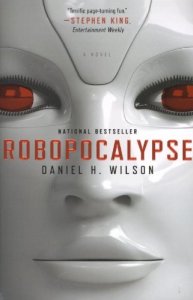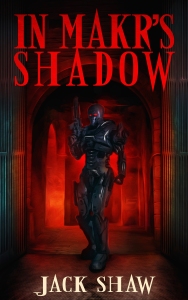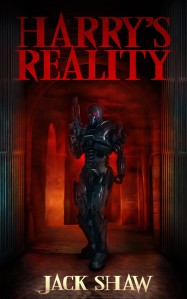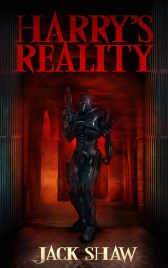
 Daniel H. Wilson’s Robopocolypse and Robogenesis, inspired by today’s world of robotics, are on the bestseller list and rightly so. In Makr’s Shadow may be a third such novel worth more than a look.
Daniel H. Wilson’s Robopocolypse and Robogenesis, inspired by today’s world of robotics, are on the bestseller list and rightly so. In Makr’s Shadow may be a third such novel worth more than a look.
I’m glad to see a fellow writer who has a similar interest. He is a roboticist, while I am a psychologist.
Our aim is as similar as our approach. We both use an apocalyptic vision to show society at its worst and at its best. To some literary publishing houses, the subject of robots is passe. Naturally, I disagree. I think it is a subject which time is now. I wrote an article on that recently.
Wilson and I have a similar vision in that our own creations “robots” or, in my case, “cyberts” could be the death of us; however, that said, these human generated or conceived creatures are something special and we can learn from our experience with them.
In Makr’s Shadow is the story of humans relying on technology to make problem-solving decisions that could result in our planet’s annihilation. I say that smiling, knowing full well, Wilson is the more established writer and has the creds to sell his books easier than I can sell mine. I heard his interview on National Public Radio, and I’d love to meet and chat with him. In my defense, In Makr’s Shadow is my debut novel and it needs some attention.
Why Cyber or cyberts and not robots? Semantics. I don’t think so.
Cyberts as I have described them in In Makr’s Shadow are sentient by connection to cyberserver; pure robots exist for mundane taskings–including street cleaning. Cyberts exist in such numbers as to be considered another race, the Cyber, more powerful in every way than their Bio counterparts.
The difference is significant. The cyberts are task- specific mobile extensions of the server, an evolving artificial intelligence called Makr. Robots are tools to aid Bios and perform perfunctory maintenance tasks, nothing more.
In spite of their inferior status, they are still connected and can bring superior “robots” with a connection or cyberts. Some cyberts perform tasks that require intellectual or combat and weapon skills to protect Makr, while others simply maintain the infrastructure of the planet.
In Makr’s Shadow, humanity had reached the end of its patience in trying to save their world from self-destruction–the problems, an “apocalypse” that they themselves caused. World leaders ultimately turned the operation of the planet to the combined intelligence of all the computers in the world, forming an evolving artificial intelligence, Makr.
There’s only one problem. Makr won’t give it back, and tries to create a whole new world populated by Cyber. To do that, he must annihilate the human race.
In Wilson’s Robogenesis, the remnants of society are picking up the pieces, while In Makr’s Shadow, most of society, 90 percent are imprisoned by illusion. Of the remaining ten percent that are not held prisoner, only one percent is actually fighting the cyberts. Interestingly enough, the survival of the human race at stake. Here, though, one man, who has the ability to see through illusions, manages to escape his imprisonment; he is different in a way that changes the world forever. It can never be the same.
“In Makr’s Shadow reads like an Isaac Asimov and Kurt Vonnegut, Jr. novel combining, action, suspense and fun. Thought-provoking. Exciting. Shaw’s characters are dynamic and real. They are as flawed as all of humanity with fears, anger, regret and arrogance, yet heroes emerge from the strangest places. All that seems lost, is not lost.”
Goodreads has good things to say as well.
The biggest difference between Wilson and my novel is probably price and availability.
 In Makr’s Shadow is available wherever e-books are sold for $2.99. I’m offering it for free to anyone who is willing to open a dialogue with me or write a review. We’ve all tried to read some horrible e-books, but I don’t believe this is one of those. I believe in this novel’s surprising message and I’m sure you’ll find it entertaining along with way.
In Makr’s Shadow is available wherever e-books are sold for $2.99. I’m offering it for free to anyone who is willing to open a dialogue with me or write a review. We’ve all tried to read some horrible e-books, but I don’t believe this is one of those. I believe in this novel’s surprising message and I’m sure you’ll find it entertaining along with way.
At the risk of losing sales of In Makr’s Shadow, I can’t help but recommend Danial H. Wilson’s robotic fiction; they sound as terrific as my own. He said, smiling. By the way, if you are interested in Wilson’s books, here is a sample from this cool site, Science Friday.
I have posted my samples In Makr’s Shadow (previously published as Harry’s Reality) on this website and will continue to do so. I am also working on a new novel called The Jaguar, so you may find clips for that as well.
Styles and approaches vary with every novelist. I hope you like mine. If you decide to take me up on my free offer, leave me a comment. Thanks.









